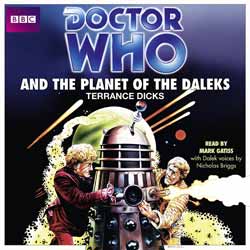|
Click here to return to the main site. Audio Book Review
“Jo peered through the panel and saw – nothing. Yet someone had entered the cabin. She could hear hoarse breathing and stealthy padding footsteps. A beaker rose in the air of its own accord, and then dropped to the floor…” After pursuing the Daleks through space, guided by the Time Lords, the Doctor and Jo Grant land on the planet of Spiridon, in the midst of a tropical jungle – and find far more than just Daleks. Vicious plants spitting deadly poison, invisible Spiridons attacking from all sides and, in hiding, a vast army waits… for the moment to mobilise and conquer... The 1973 Doctor Who serial Planet of the Daleks is a basic but exciting adventure story. There’s nothing fancy about it – indeed, it recycles elements from a couple of 1960s Terry Nation Dalek stories – it’s just solid entertainment. In adapting Nation’s scripts to produce the 1976 novelisation, Terrance Dicks takes a similarly no-frills approach. He cannot do much to draw out the characterisation, because there isn’t much in the way of characterisation to begin with (this was never Nation’s strong suit), so instead Dicks concentrates on incident (which was always Nation’s strong suit), moving the plot forward at a rapid pace to produce an efficient 120-page book. As a result, the three-hour running time of this triple-disc unabridged audio release isn’t far in excess of the duration of the original six-part serial. There are a few little changes along the way, mainly to remove story padding. For example, the novelisation opens a few minutes into the screen version, with the Doctor lying unconscious on the couch, having already transmitted his telepathic message to the Time Lords. Whether by accident or design, this little alteration allows the book to work equally well as a follow-up to the previous television serial, Frontier in Space, or to Malcolm Hulke’s novelisation of it, Doctor Who and the Space War – despite the fact that Hulke changed the ending of his book to remove the cliffhanger. In Doctor Who and the Planet of the Daleks, Jo’s entry in the TARDIS log vaguely refers to the Doctor having been injured in a Dalek ambush (on screen it was a scuffle with the Daleks’ allies, the Master and the Ogrons). In the parallel universe of the novelisations, this could be interpreted as an incident that occurred “off the page” between books – perhaps the Doctor and Jo materialised aboard a Dalek spaceship while trying to thwart the creatures’ plans for galactic domination, and the ambush took place there. Dicks also adds a lot of sense to the ending, describing the Doctor and Jo running the gauntlet of the deadly sponge-plants and gaining access to the fungus-covered TARDIS more realistically than they do on screen (where they just cover their faces and hands as best they can). Surely the police box would be deeply encased in fungus by now. In the book it is, and the travellers use Thal protective gear in order to gain entry. One thing the author does not attempt to rationalise is why the TARDIS’s automatic oxygen supply is so limited – how does it cope during long periods in space or in the time vortex? Mark Gatiss reads what is one of his favourite Doctor Who books with a great deal of style. The writer / actor has often been accused of being an unsubtle performer, which makes his restrained reading all the more remarkable. His cool, level tones perfectly match the matter-of-fact style of Dicks’s writing, only turning up the drama when the prose demands it. Gatiss clearly relishes “playing” the Third Doctor, mimicking Jon Pertwee’s tones rather well. He does some good impersonations of other members of television cast, too – in particular Tim Preece as Codal. He doesn’t get to do the Daleks, though, who are voiced, as ever, by Nicholas Briggs. Adding to the experience is Simon Power’s sound design. Of particular note are the revolting squelching noises for the deadly flora of Spiridon. Power’s sounds also help to supplement and emphasise the action when the novelist’s scant descriptions might otherwise threaten to lose the listener – for example, when the icecano erupts, we hear the avalanche of ice. Doctor Who and the Planet of the Daleks is not a classic work of literature by any means, but it is thoroughly entertaining – and all the more so now thanks to the efforts of Briggs, Power and especially Gatiss. 9 Richard McGinlay Buy this item online
|
|---|

